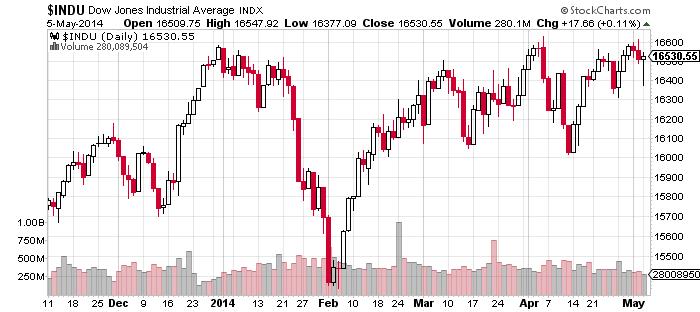Did you see this story in the Wall Street Journal last Friday?
“Retirement investors are putting more money into stocks than they have since markets were slammed by the financial crisis six years ago… Stocks accounted for 67% of employees’ new contributions into retirement portfolios in March… That is the highest percentage since March 2008…” (Source: Wall Street Journal, May 2, 2014.)
You read that right. With stocks at a record-high (and valuations stretched), retirees are pouring back into stocks. Are they getting ready to get slaughtered again? I believe so.
If you are a long-term reader of Profit Confidential, you know my take: the “bear” has done a masterful job at convincing investors the economy has recovered and the stock market is a safe place to invest again. Meanwhile, nothing could be further from the truth.
We are living the slowest post-recession recovery on record. And that recovery has been manipulated by the tampering of the Federal Reserve. You see, the Federal Reserve played a key role in driving the key stock indices higher. In 2009, in the midst of a financial crisis, the central bank started printing money and buying bonds. This resulted in lower bond yields. Those who had money in bonds, who had essentially paid nothing, moved into stocks.
And those record-low interest rates enabled companies in the key stock indices to borrow money and issue new equity, using the money to buy their own stock, thus pushing up per-share corporate earnings.
The end result? 2013 was a banner year for stocks on the key stock indices. But as 2014 came around, we began to see cracks in the key stock indices. The stock market isn’t rising like it used to, corporate earnings are coming in at their lowest level since 2009, and now the housing market is starting to get weak, too.
Take a look at the chart of the Dow Jones Industrial Average below. The Dow Jones has been trading sideways since 2014 began. In fact, we are about four-and-a-half months into the year and the Dow Jones has been negative for 2014 so far. Other key stock indices, like the Russell 2000 small-cap index and the NASDAQ Composite index, are down for the year.
Chart courtesy of www.StockCharts.com
While companies in the key stock indices used financial tricks, such as buying back their own stock and slashing expenses, to prop up earnings, the bottom line is that revenue growth (because of a weak economy) just isn’t there. Of the 240 companies on the S&P 500 that reported their first-quarter results—only 53% of them were able to beat revenue estimates. (Source: Ibid.)
Individuals buying stocks on key stock indices with their retirement savings now are making a big mistake. They are giving in to the notion that all is well…that key stock indices will continue to go higher. They are in for a surprise.
Disclaimer: There is no magic formula to getting rich. Success in investment vehicles with the best prospects for price appreciation can only be achieved through proper and rigorous research and analysis. The opinions in this e-newsletter are just that, opinions of the authors. Information contained herein, while believed to be correct, is not guaranteed as accurate. Warning: Investing often involves high risks and you can lose a lot of money. Please do not invest with money you cannot afford to lose.
